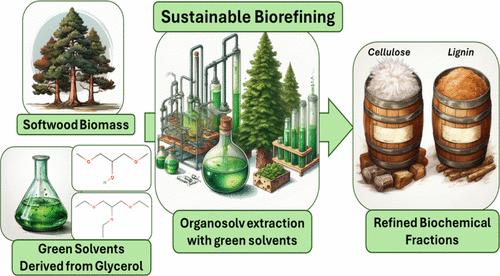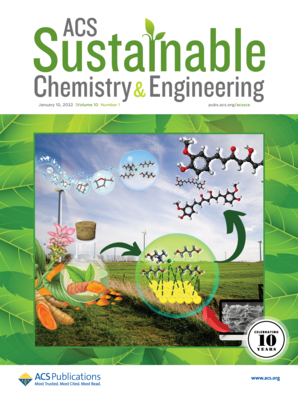Glycerol-Derived Solvents for Tractable Organosolv Extraction of Softwood Lignins
IF 7.1
1区 化学
Q1 CHEMISTRY, MULTIDISCIPLINARY
引用次数: 0
Abstract
In the present study, glycerol-derived ethers (GDEs) are evaluated as green solvents to facilitate organosolv extraction of lignins from softwood biomass. GDEs assessed in the present investigation consist of glycerol skeletons etherified with alkyl constituents (e.g., methyl, ethyl), including 1,3-glycerol diethers and 1,2,3-glycerol triethers. GDEs are derived from glycerol, a high-volume byproduct produced by the biodiesel industry. In comparison to glycerol, GDEs are ∼3 orders of magnitude less viscous while maintaining high boiling points (>160 °C), facilitating improved processability and extraction of lignins under mild temperatures and pressures. The influence of organosolv conditions, specifically temperature (120–180 °C), batch holding time (10–240 min), Brønsted acid concentration, and solvent composition on the extraction of lignins from softwood feedstocks are evaluated. Under optimal conditions (150 °C, 60 min), over 70 wt % of lignins are extracted from softwood biomass. More severe conditions (e.g., 160 °C, 60 min; 180 °C, 60 min) promoted higher delignification (80–90 wt %) but at the expense of lower pulp yields (<40 wt %). The influence of process conditions and solvent speciation on the molecular structure of residual pulps and isolated lignins is further interrogated by IR and NMR spectroscopy, electron microscopy, and mass spectrometry. The “greenness” of GDE organosolv was quantitatively benchmarked against other biobased, high-boiling point solvents (glycerol, Cyrene, γ-valerolactone (GVL)) applied for organosolv in the literature by evaluating two mass-based green chemistry metrics (e.g., mass intensity, solvent intensity). Green chemistry benchmarking demonstrated that GDE organosolv is highly competitive with previous reports. Overall, the present study advances insights into the application of eco-friendly solvents to support organosolv extraction of lignins under mild conditions and supports sustainable biorefining of lignocellulosic biomass.

用于软木木质素有机溶剂萃取的甘油衍生溶剂
本研究将甘油衍生醚(GDEs)作为绿色溶剂进行评估,以促进从软木生物质中有机溶剂提取木质素。本研究中评估的甘油衍生醚由烷基成分(如甲基、乙基)醚化的甘油骨架组成,包括 1,3-甘油二醚和 1,2,3-甘油三醚。甘油二醚是从甘油中提炼出来的,甘油是生物柴油行业生产的一种高产量副产品。与甘油相比,GDEs 在保持高沸点(160 °C)的同时,粘度降低了 ∼ 3 个数量级,有利于在温和的温度和压力下改进木质素的加工和提取。本研究评估了有机溶胶条件,特别是温度(120-180 °C)、批次保温时间(10-240 分钟)、布氏酸浓度和溶剂成分对从软木原料中萃取木质素的影响。在最佳条件下(150 °C,60 分钟),从软木生物质中提取的木质素超过 70 wt %。更苛刻的条件(例如,160 °C,60 分钟;180 °C,60 分钟)可提高木质素脱除率(80-90 wt %),但纸浆产量较低(40 wt %)。红外光谱、核磁共振光谱、电子显微镜和质谱分析进一步研究了工艺条件和溶剂种类对残留纸浆和分离木质素分子结构的影响。通过评估两种基于质量的绿色化学指标(如质量强度、溶剂强度),将 GDE 有机溶胶的 "绿色性 "与文献中应用于有机溶胶的其他生物基高沸点溶剂(甘油、Cyrene、γ-缬内酯 (GVL))进行定量比较。绿色化学基准测试表明,GDE 有机溶胶与之前的报告相比具有很强的竞争力。总之,本研究有助于深入了解如何应用环保溶剂在温和条件下对木质素进行有机溶剂萃取,并支持木质纤维素生物质的可持续生物炼制。
本文章由计算机程序翻译,如有差异,请以英文原文为准。
求助全文
约1分钟内获得全文
求助全文
来源期刊

ACS Sustainable Chemistry & Engineering
CHEMISTRY, MULTIDISCIPLINARY-ENGINEERING, CHEMICAL
CiteScore
13.80
自引率
4.80%
发文量
1470
审稿时长
1.7 months
期刊介绍:
ACS Sustainable Chemistry & Engineering is a prestigious weekly peer-reviewed scientific journal published by the American Chemical Society. Dedicated to advancing the principles of green chemistry and green engineering, it covers a wide array of research topics including green chemistry, green engineering, biomass, alternative energy, and life cycle assessment.
The journal welcomes submissions in various formats, including Letters, Articles, Features, and Perspectives (Reviews), that address the challenges of sustainability in the chemical enterprise and contribute to the advancement of sustainable practices. Join us in shaping the future of sustainable chemistry and engineering.
 求助内容:
求助内容: 应助结果提醒方式:
应助结果提醒方式:


